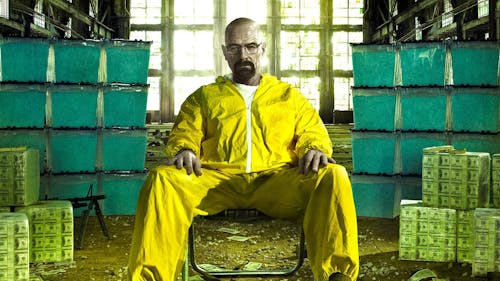Impact of 'Breaking Bad' remains strong in 2023

On January 20, 2008, the first episode of the now-acclaimed TV show "Breaking Bad" aired on AMC. Starring Bryan Cranston as Walter White and Aaron Paul as Jesse Pinkman, the "Pilot" episode was met with immediate critical and commercial success, with the show spanning five seasons over the next four years.
The show has remained in the popular sphere ever since with the advent of social media fueling millions of hilariously stupid "Breaking Bad," "El Camino: A Breaking Bad Movie" and "Better Call Saul" edits, memes and videos. Every few months or so, a particularly poignant scene from "Breaking Bad" will go viral, spawning an onslaught of edits and reaction images.
Personally, the only reason I wanted to watch the show was to understand the memes. I was sick of going on Twitter and not being in on the joke. So while I was sick over the break, I used my isolation time to binge "Breaking Bad" and "El Camino: A Breaking Bad Movie."
Needless to say, I was absolutely blown away by the masterful writing, developed (and very real) characters and the way every single detail in the setting was utilized to create what was nearly a perfect TV show.
Now that it’s been 15 years since the first episode, fans and critics alike are able to recognize the impact this show has had on TV and popular culture. "Breaking Bad" was arguably one of the biggest cultural phenomena of the 2010s. It won 16 Primetime Emmys — Cranston won four times, Paul won three times and Anna Gunn as Skyler White won two times.
Prior to "Breaking Bad," the show's creator Vince Gilligan was heavily involved in "The X-Files" as a writer and producer, garnering multiple nominations across various awards panels for his writing and directing.
One of the main aspects that set "Breaking Bad" apart from its counterparts at the time was the organic character development. In an interview, Gilligan said that he pitched the show by saying, "You take Mr. Chips and turn him into Scarface."
Few shows explored morality like "Breaking Bad" did at the time, especially through the eyes of an extremely flawed main character. Walter’s progression from an overqualified high school chemistry teacher to a ruthless drug kingpin was not rushed or forced, but it was expertly woven throughout the show's plot.
"Breaking Bad" does not aim to celebrate men like Walter but rather expose how horrible and morally awful a person can be.
Multiple episodes start with a flash-forward, setting the tone for what the viewers are going to witness for the next hour. Things normally go wrong for Walter — he often appears to be running away from authorities, holding a gun or wearing nothing but a green button-down shirt.
The show presents Walter as a milquetoast, meek man who was thrown into situations that were handed to him while simultaneously having him fail to acknowledge the many choices he made that morphed him into the drug kingpin he is.
Gunn’s performance was one of an unfortunate bystander and accomplice to Walter’s drug empire, with one scene of hers personally standing out to me.
In a behind-the-scenes video for the episode "Ozymandias," Gunn acted out a pivotal scene in the show several times until Gilligan deemed it perfect. That performance was the metaphorical nail in the coffin that cemented her as the best actress in the show.
Gunn's character often felt as if she had no way out, and while she did make a few questionable decisions, the way she acted was likely as anyone in the same situation would. Gilligan said in an article that he is still "troubled" by the extreme dislike fans sling at him about Skyler, who likely see her as an obstacle to Walter’s activities.
"Breaking Bad" is also one of the more visually compelling stories that have been aired. The uniformity of the color palette, costume choices and setting gave the viewers a sense of monotony.
When Walter begins to involve himself more in the drug business, more motifs keep popping up for him. From the pink bear to the shifting hues of the settings to the increasing use of yellow as Walter becomes more dangerous, "Breaking Bad" goes beyond the written word to deliver an impactful and well-crafted story.
The impact of the show is only amplified by its fanbase. The tone of the memes circulated on various social media platforms vastly differs from the mood of the show, making the contrast all more delightful.
The reputation of "Breaking Bad" is held in high regard, and its marketability is due to the seeming impasse edits that kept the show that way. I can't go on Twitter without seeing a Saul or Walter edit either on my timeline or in the replies. This just speaks to how influential the show is almost a decade after its finale.
Whether you watched the show while it was airing or more recently, like myself, "Breaking Bad" is a classic that will continue to stand the test of time. This show arguably changed the game for TV and even managed to create a prequel show that arguably matched the success of its predecessor. If you’re hesitant to watch the show, take this article as your sign to finally begin your journey with Walter.



